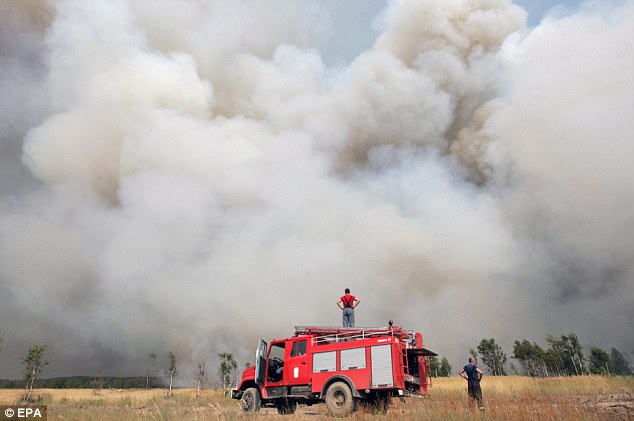Russians fight to keep wildfires away from top secret nuke plants
Fierce wildfires raging across Russia are a risk to the top-secret capital of its nuclear research industry, officials admitted last night.
Two soldiers were killed yesterday fighting blazes dangerously close to the highly sensitive town of Sarov, despite claims in recent days the fires were under control.
The town, where the atomic complexes are based, is so tightly guarded it remains closed to foreigners, as in Soviet times.

Danger: Fire fighters are desperately trying to control more than 500 wildfires in Russia, with some moving close to nuclear facilities east of Moscow

White out: Only a few tourists venture out in Red Square as the Russian capital is shrouded in heavy smog prompted by peat fires
Hundreds of wildfires have been burning across three time zones in Russia. Prime Minister Vladimir Putin yesterday boarded a fire-fighting plane to dump water on blazes close to Moscow, where the smoke has caused thick smog.
At Sarov, 230 miles east of the capital and known during the Cold War as Arzamas-16, soldiers have dug a five-mile canal to protect the nuclear arms site.
The two who died were tackling blazes in forests surrounding the town, which remains ringed
by high fences and military checkpoints.

All hands on deck: Russian Prime Minister Vladimir Putin is seen in a BE-200 firefighting aircraft flying over the Ryazan region
One, rifle battalion commander Vasily Tezetev, 22, ‘died the death of a hero’, according to the local emergency centre. Officials say some sensitive nuclear equipment has been removed from the site to be stored away from the fires.
An official for Russian nuclear body Rosatom insisted last night the nuclear facilities were ‘working normally’ but admitted there were four sites close to Sarov ‘where the risk of sudden inflammation
is still high’.
Conflicting reports over the threat have raised fears that officials are covering up the extent of the damage.
Built by Nazi prisoners of war, the first Soviet nuclear bomb was created in the town and it remains the headquarters of Russian atomic research.
Fires also threaten Snezhinsk, home to another of Russia’s top nuclear research centres, and the reprocessing plant Ozersk, also in the Urals, where a state of emergency has been declared.
Around 557 blazes are still raging, with forecasters fearing the extremely dry conditions could last another ten days.
Moscow remains covered by a stifling
smog, with morgues full from a huge rise in the numbers dying during the
heat wave.
The cost
already to the Russian economy already amounts to a staggering £10
billion and experts have warned the damage will stall Russia's recovery
from recession.
'Economic
growth in Russia is slowing and the heat wave will lead to a further
slowdown,' said Alexander Morozov, chief economist for HSBC bank in
Russia.

This map shows smoke from wildfires as seen from space

Visibility is badly affected,making the job of firefighters even harder

Under-threat: Military patrolled nuclear facilities are now in danger of being caught up in the fires

Losing battle: Russian firefighters escape from a dangerous area as they try to extinguish wildfire near the city of Likino-Duliovo

The cause of the fires which have decimated wildlife is Russia's most intense heat wave in 130 years of record-keeping
-
 Bully beating on blind teen gets serious payback
Bully beating on blind teen gets serious payback
-
 Airbus A380 caught up in terrifying crosswind landing
Airbus A380 caught up in terrifying crosswind landing
-
 Trump-baiting new South Park 'Where My Country Gone' preview
Trump-baiting new South Park 'Where My Country Gone' preview
-
 Pope Francis makes historic speech to lawmakers on Capitol...
Pope Francis makes historic speech to lawmakers on Capitol...
-
 'King of gypsy music' beats pregnant girlfriend on live TV
'King of gypsy music' beats pregnant girlfriend on live TV
-
 GRAPHIC: Police shoot and kill Delaware man in wheelchair
GRAPHIC: Police shoot and kill Delaware man in wheelchair
-
 Reluctant teenage jihadi cries before suicide mission
Reluctant teenage jihadi cries before suicide mission
-
 Big fight breaks out at a Florida supermarket
Big fight breaks out at a Florida supermarket
-
 Rosie Kennedy at debutant ball with mom and sister in 1962
Rosie Kennedy at debutant ball with mom and sister in 1962
-
 John Boehner cannot contain emotion as Pope speaks
John Boehner cannot contain emotion as Pope speaks
-
 Moment prankster Vladimir Tzapaev gets shot with an airgun
Moment prankster Vladimir Tzapaev gets shot with an airgun
-
 Pope tells Congress US should reject hostility to immigrants
Pope tells Congress US should reject hostility to immigrants
-
 High school teen who defended a blind classmate who was...
High school teen who defended a blind classmate who was...
-
 Repent! Pope Francis lectures America on gay marriage,...
Repent! Pope Francis lectures America on gay marriage,...
-
 Controversial South Park episode shows Donald Trump being...
Controversial South Park episode shows Donald Trump being...
-
 EXCLUSIVE PICTURES: How Rosemary Kennedy went from a vibrant...
EXCLUSIVE PICTURES: How Rosemary Kennedy went from a vibrant...
-
 Zuckerberg can't make Facebook friends with China on...
Zuckerberg can't make Facebook friends with China on...
-
 Saudi prince is arrested on suspicion of a sex crime after...
Saudi prince is arrested on suspicion of a sex crime after...
-
 Kim Zolciak-Biermann suffers stroke minutes after returning...
Kim Zolciak-Biermann suffers stroke minutes after returning...
-
 'It's the right time to do it': John Boehner resigns as...
'It's the right time to do it': John Boehner resigns as...
-
 Four dead and at least 52 injured after amphibious Duck tour...
Four dead and at least 52 injured after amphibious Duck tour...
-
 Hunter who broke both legs in the wilderness wrote goodbye...
Hunter who broke both legs in the wilderness wrote goodbye...
-
 Rape and child abuse 'are rife in German refugee camps':...
Rape and child abuse 'are rife in German refugee camps':...
-
 'Get everybody out of that house': Heroic gas worker saves...
'Get everybody out of that house': Heroic gas worker saves...























































































































































































































































































